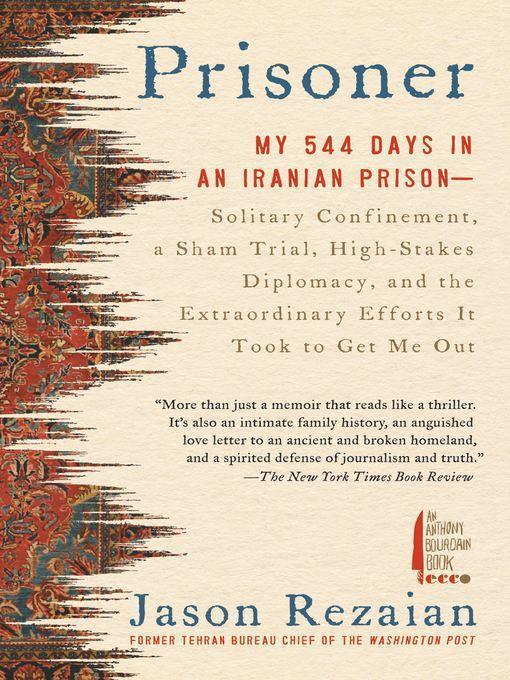
Prisoner
My 544 Days in an Iranian Prison—Solitary Confinement, a Sham Trial, High-Stakes Diplomacy, and the Extraordinary Efforts It Took to Get Me Out
کتاب های مرتبط
- اطلاعات
- نقد و بررسی
- دیدگاه کاربران
نقد و بررسی

August 1, 2018
In July 2014, Rezaian was serving as Tehran bureau chief for the Washington Post when he was arrested by Iranian police and accused of spying for America. He ended up in prison for 18 months, used as a bargaining chip in negotiations for the Iran nuclear deal even as his family lobbied for his release and #FreeJason boomed on social media. This memoir reflects not only on his imprisonment but his childhood in California and his close bond with his rug merchant father. With a 100,000-copy first printing.
Copyright 2018 Library Journal, LLC Used with permission.

January 1, 2019
Washington Post opinion writer and CNN contributor Rezaian recounts his 544 days of imprisonment at the hands of the Iranian regime.A native of Iran whose family had immigrated to the United States decades earlier, the author moved to Tehran to head the Washington Post bureau there. It was a good gig, well paid in dollars, while, because his wife was an Iranian citizen, they were allowed to pay in local currency. "Life was good," he writes. Although he favored local-color stories, often about food, and guided Anthony Bourdain through the city for an episode of Parts Unknown (this book is published under Bourdain's imprint), he still managed to fall afoul of the secret police. The charge eventually cooked up for him was definitively Orwellian: "As a member of the American press writing what could only be perceived as neutral stories about Iran, I was attempting to soften American public opinion toward the Islamic Republic"--a softening that would allow American values to circulate within the country. After developing strategies to avoid despair while in solitary confinement ("if you're lucky you learn to quiet your mind, just a little, and live softly"), Rezaian could do little more than wait it out even as Iranian agents threatened to add time to his sentence because his mother was publicly protesting his imprisonment. "Why is your mother coordinating with the BBC to ruin your life?" asked one. The author credits a concerted campaign on the part of Post editor Martin Baron, his brother, and other intermediaries for his release after having been "the plaything of some of the nastiest authoritarian ideologues to roam the earth in many decades." Rezaian also allows that one of his captors got at least one thing right: He correctly predicted the outcome of the 2016 election in the U.S., saying, "Trump is the candidate that hates Muslims most."Of interest to students of the Iranian system as well as free-press advocates.
COPYRIGHT(2019) Kirkus Reviews, ALL RIGHTS RESERVED.

November 15, 2018
As the Washington Post's Tehran bureau chief, Rezaian was almost evangelical in his desire to portray Iran as something other than a clich�d image of brutal authoritarianism. His human-interest stories, many focusing on food and culture, invited the world to view the country he loved as much as his native America in a new, more ecumenical light. The irony, then, that Rezaian would be arrested along with his journalist wife on espionage charges only served to underscore the harsh truth behind the image of a politically repressed society. After being imprisoned for 18 months, Rezaian's release became tied to the Obama administration's nuclear deal with Iran and attracted advocates from John Kerry to Anthony Bourdain. Rezaian's candid and revelatory memoir of his incarceration is interlaced with touching tributes to his Iranian-born father, his journalistic mentor, Christopher Hitchens, and his beloved wife, Yeganeh. At a time when journalists find themselves increasingly under fire, both abroad and at home, Rezaian's dedication to his craft is an inspiring homage to the fearlessness of these intrepid purveyors of truth.(Reprinted with permission of Booklist, copyright 2018, American Library Association.)

























دیدگاه کاربران